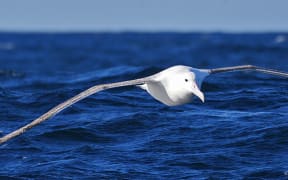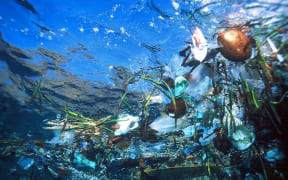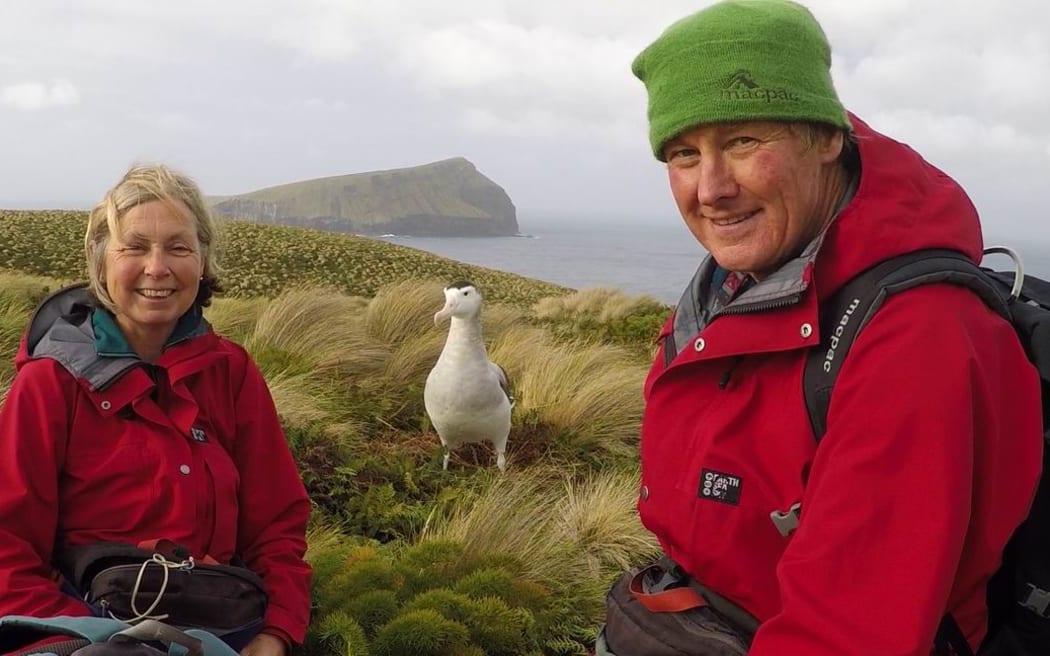
Scientists Graeme Elliott and Kath Walker are are monitoring albatrosses on Adams Island. (The couple are shown with an Antipodean wandering albatross - very closely related to the Gibson's Albatross). Photo: SUPPLIED
Two scientists are camped out on a remote island far south of New Zealand on the hunt for what's killing off the native albatrosses that breed there.
Department of Conservation scientists Graeme Elliott and his partner Kath Walker are staying for two months in a hut on Adams Island, next to Auckland Island and about 500 kilometres south of New Zealand.
There they will be watching the colony of Gibson's wandering albatross, which nests on the island every summer.
"It's a great big albatross, about the same size as the royal albatrosses from Dunedin, and they're doing appallingly," Elliott said.
"Their populations have declined by about 50 percent over the last fifteen years ... We've got to find out what to do about it."
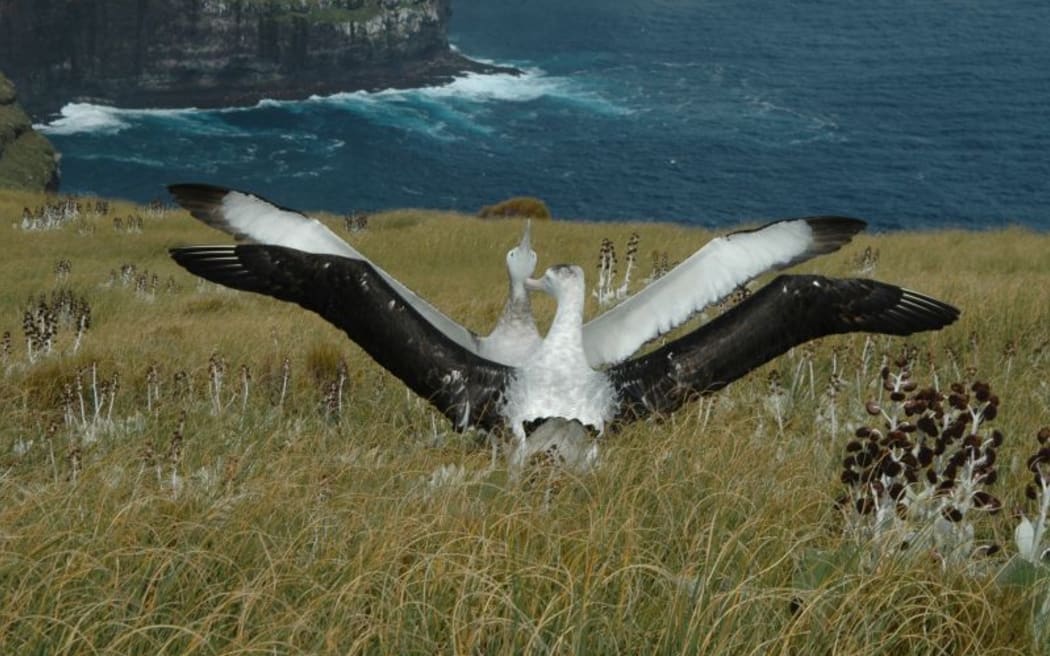
Gibson's wandering albatrosses courting on Adams Island. Photo:
Elliott and Walker are two of several scientists sent by the Department of Conservation to New Zealand's subantarctic islands to research wildlife.
"We all get out here on a 25 metre steel ketch that the department charters to get us out here. That poor boat has been running itself ragged running around the sub-antarctic," Elliott said.
"It's all a bit unpleasant, the southern oceans are some of the roughest oceans in the world. Getting out here is often horrible, sometimes lovely but often horrible. Most of us get seasick."
It was a two day voyage between New Zealand and the island, "so there's no escaping for the weekend," he said.
"These birds breed in the summer and if you want to find out how they're doing the best thing is to turn up when they're nesting. All the birds turn up on the island, so you can see who's alive and who's dead," he said.
"By turning up for a month or two in summer, which is what we do, you can get the whole story of the life of these birds."
The biggest threat to Gibson's albatrosses were fishing vessels.
"The Gibson's albatross eat squid and the tuna longline boats bait their hooks with squid ... So these birds are terribly vulnerable to being caught by boats," he said.
"The albatrosses nest on Adams Island, but all their foraging happens up at latitudes of about Wellington. They nest in the south because they're big birds and they need islands that are windy and without trees."
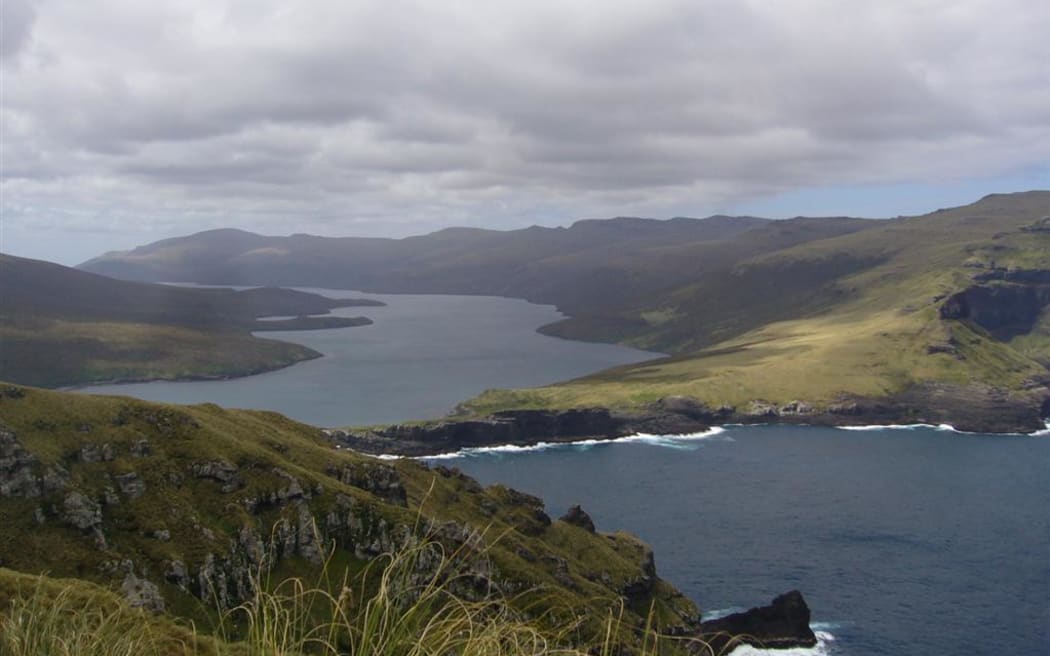
Carnley Harbour separates Adams Island (right) from Auckland Island, the group lies about 500km south of New Zealand, and is an important site for seabirds to nest. Photo: Public Domain/ L Mead & T Nicklin
Climate change was another existential threat to the birds.
"Climate change and the warming of the oceans is having a big impact on sea birds. [But] if it is global warming, there's not a lot we can do about that in the short term so we've got to focus on the fishing boats," Elliott said.
The island itself was a paradise with little for Elliott and Walker to actually do beyond monitoring the birds.
"There's nothing you can really do on the islands at all, Adams Island is completely pest free. There's no predators, there's nothing wrong with it," he said.
"All we can do is try to find out what's going wrong at sea."
Elliott said he had met Walker while doing research on the very same island in 1989.
"At the time albatrosses had just come to prominence because people realised they were being slaughtered by fishing boats, so we started counting all the albatrosses on the island," he recalled.
"When we got back to New Zealand we realised we had done a terrible job, so we decided we would come back again the next year and do a better job. We've been coming back every year since."

